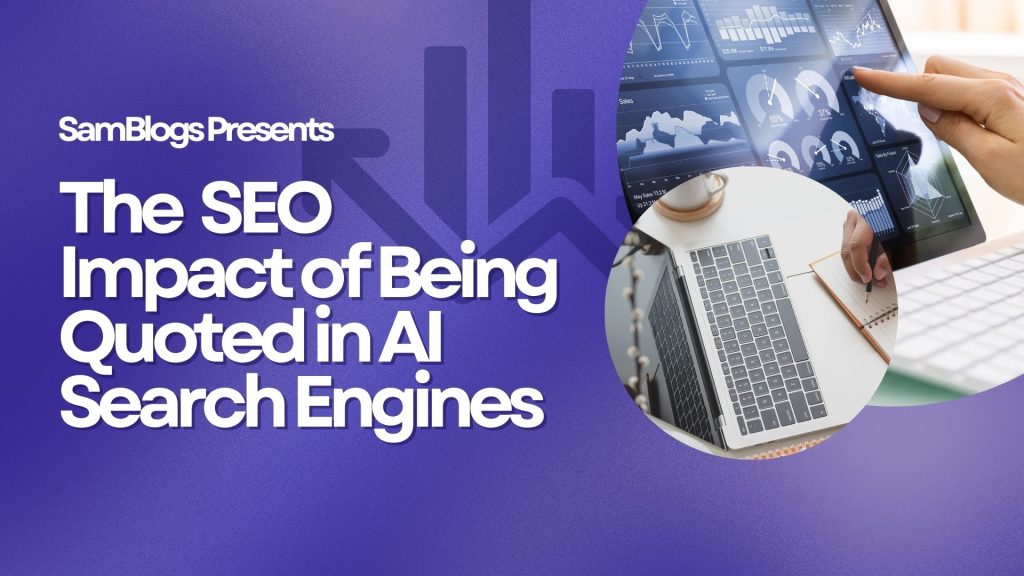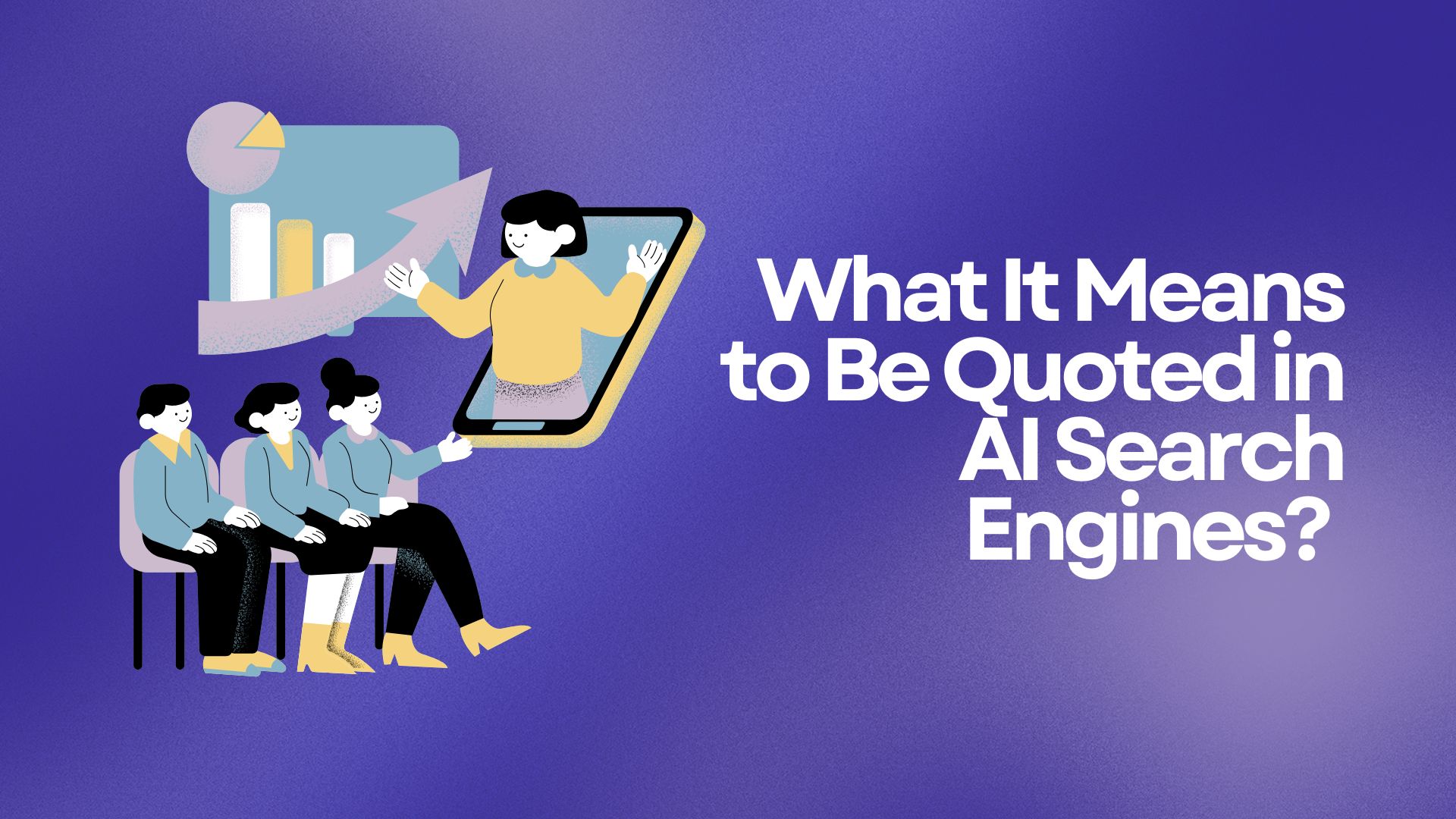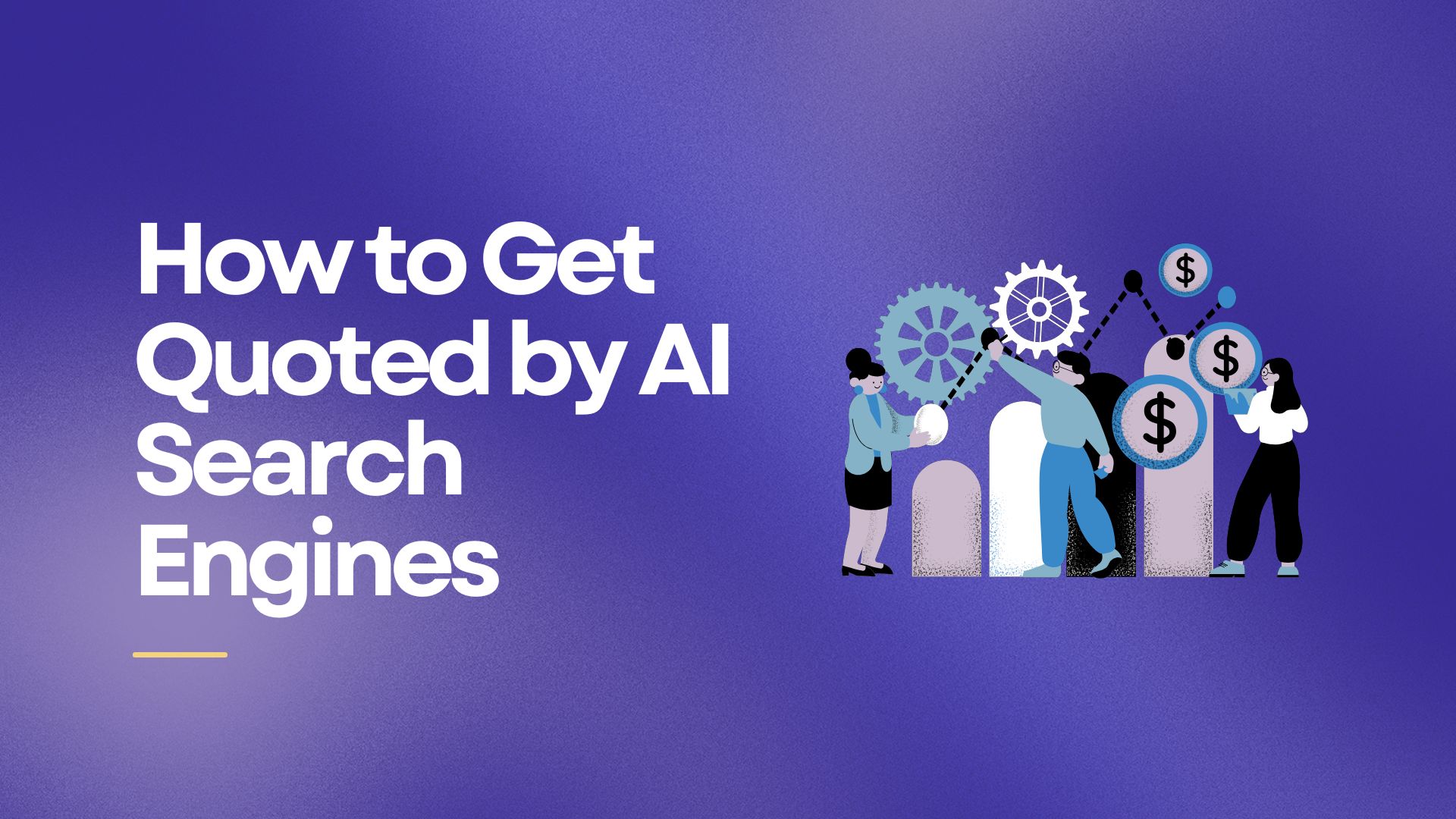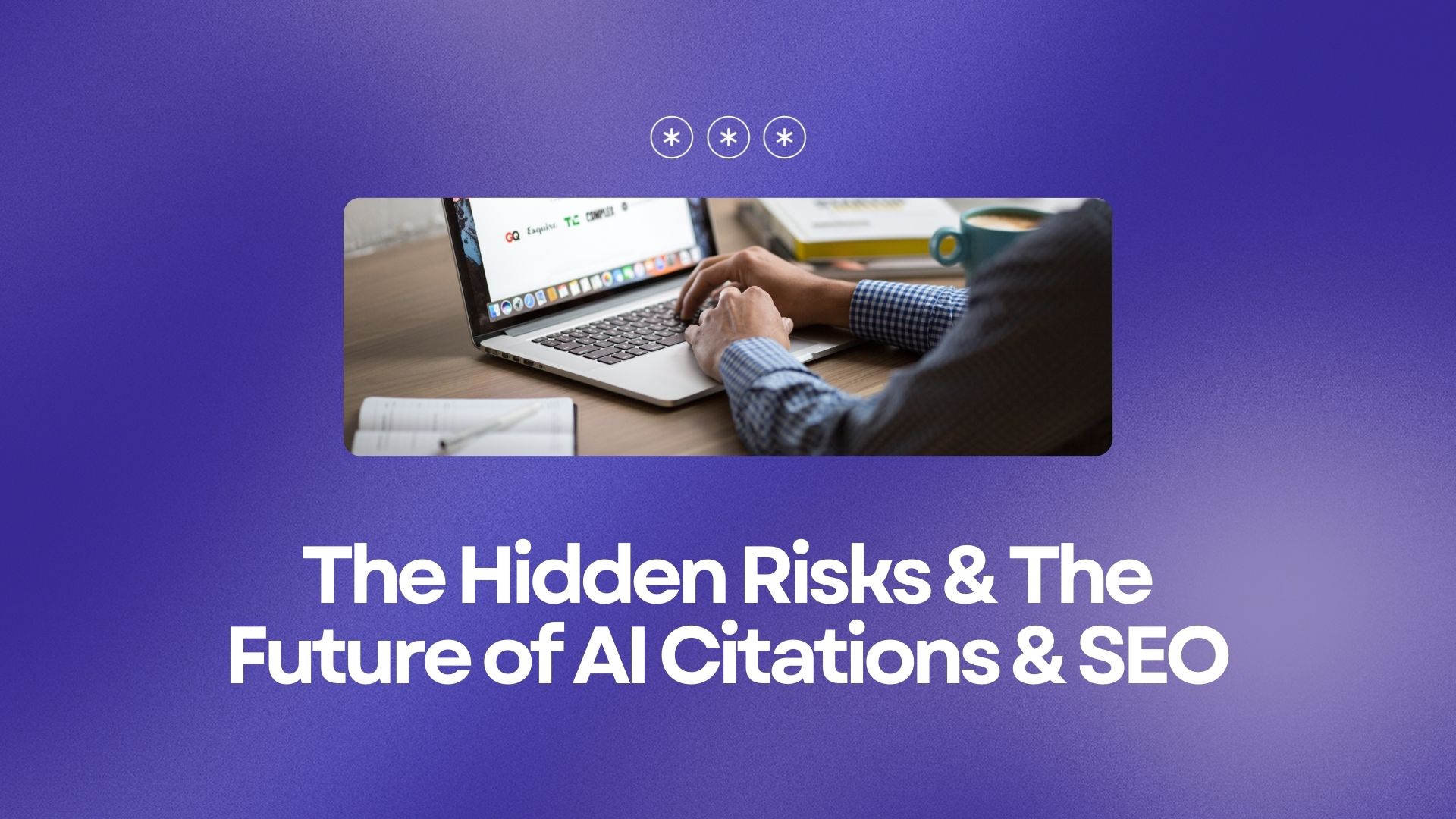In the dynamic landscape of search engine optimization (SEO), a new and powerful element has emerged, namely, the impact of being referred to or quoted by AI search engines and conversational interfaces, including ChatGPT, Perplexity, and Gemini. Previously, SEO was primarily focused on hacking the Google algorithms. Visibility to the level of the AI models, now, is an independent, though not parallel, space. This is such a small but significant change.
Simply by discovering you as a source, an AI could present you with an entire basket of benefits, beginning with being considered a trustworthy source and thus growing your knowledge of a brand, which ultimately is the reason you are continuing to practice SEO regularly. In this article, we will explore the hidden SEO strength of AI citations, what benefits they can provide, and how to make yourself heard. We shall also discuss the threats and look at the direction this trend may be taking.
Contents
What It Means to Be Quoted in AI Search Engines?
In the case of an AI search engine or chatbot, when a user asks the AI a question, the AI will compile data based on various sources to generate a complete answer. To quote, or be quoted, is to have your website, article, or brand named as the source of that response.
How this might occur is many:
- Direct Attribution: The AI may very well say, [Based on Your Brand/Website]… or even give a direct connection to your content.
- Implied Reference: The AI response is a quick explanation, or even a summary of your work, but does not necessarily refer to you.
- Reference Links: A good example is Perplexity, where the user can see the links or sources based on which the AI retrieved the answer. One of these sources can be your website.
- In-line Citation: The AI also adds a number or a link to your content to supplement the text of its answer that is associated with the specific fact or statement.
- Snippet placement: Featured snippets often become the primary source of AI-trained models, so the exposure of the source to the answer form of an AI carries over to the answer form of a traditional Google Search.
Besides that, a link made by a person is just like a voting card, which shows that the site, which the link points to, is worthy of Google’s attention. Conversely, AI content is a one-on-one communication with the user, in which the answer is the content and the offered solution. Eventually, this difference can lead to completely new ways of establishing authority and relevance in the online world.
The SEO Value of AI Citations
It is mentioned that an AI is an example of a complex and diverse range of benefits, which influence the placement in search engines that extends well beyond a single link.
Authority Signaling
It is a strong indication of what you know, and it will show when an artificial intelligence system chooses to use your content as the primary foundation of its solution. It is not a simple algorithm that is indexing your site here, but a complicated model, which thinks that your data is the best solution to a query the user has posed.
This voice of authority can also be partially influenced by how traditional search engines view your site, especially as their own AI capabilities and models are being integrated.
Brand Exposure
There is nothing that can match the popularity of an AI search engine with your name on it. So, your brand is directly displayed in the response rather than a user needing to visit your site.
Furthermore, the user immediately associates your name with a high-quality, trustworthy answer. In addition to this, a well-known brand name will mean more people will be searching your brand name on Google, which is a crucial indicator of brand power.
Trust Multiplier
The most valuable thing in the world during fake news and misinformation is trust, and this holds particularly well on the internet. Thus, it is a kind of trust multiplier when an AI system suggests to users your work.
The reason is that the number of users who expect to find their answers in AI is increasing constantly, and, in case your sources are often among those mentioned as the most credible ones, not only will they place their trust in AI, but they will also be more likely to trust what you write.
Early Mover Advantage
The AI search environment is not developed at all. Therefore, artists and brands that optimize their content in advance to secure AI mentions can enjoy terrific first-mover benefits, strategizing the entire game ahead of competitors. They are the first to discuss the things that were not clear before the appearance of this channel. This new route will not only help brands stay ahead of the pack but also gain a long-term and dominant role in the changing AI search patterns.
How AI Citations Influence Organic SEO?
The benefits of AI citations are not limited to the AI environment; a significant (ripple) effect on your traditional organic SEO remains the main takeaway of the article.
Increased Branded Search Queries
The foremost direct effect of AI citations, as highlighted before, is a rise in branded search queries. Upon discovering that the brand name has been mentioned by an AI, the consumer will most probably not look at the link right away but will instead open a new tab and check the brand name there.
Indirect Traffic from AI Reference Links
The vast majority of AI responses are “zero-click”; nevertheless, there are some platforms like Perplexity that allow access to the sources of the references. So, the direct referral traffic to your site is created when a user clicks on these links. In most cases, the traffic is exceptionally qualified because the user is already interested in the topic that your content addresses.
Higher Probability of Backlinks from Journalists, Researchers & Bloggers
In recent times, AI search engines are being increasingly utilized by bloggers, journalists, and researchers for their preliminary research. If these tools keep citing your content regularly, it will show up at the top when they present their findings. This makes it much more likely that they will also cite what you have written in their own articles, with all the benefits that entails, such as high-quality backlinks from sites with authority, which can do wonders for SEO overall.
E-A-T Signals Enhanced
Suppose an artificial intelligence cites something you have produced. In that case, this is an excellent way to show Google that you are good at what you do (expertise), have some official status (authoritativeness), and are trustworthy. You can then use this as a direct source for other people because not only is the information correct, but there’s enough trust behind its publication for use by sophisticated AI models, all of which helps boost E-A-T signals and could mean higher rankings in regular searches, too.
Cross-Engine Visibility
When you optimize content for AI citations, it’s no longer restricted to Google. By making sure it can also be surfaced via platforms like ChatGPT, Perplexity, and Gemini, you spread your risk as well as your potential audience. A presence on these tools now might mean being found through them is more common in future searches, putting early adopters at an advantage.
How to Get Quoted by AI Search Engines?
Having material quoted by machines involves a shift away from some classic principles of search engine optimisation (SEO). Instead of focusing heavily or exclusively on keywords, one must think about having the kind of information that is concise, useful, and well-structured around a particular topic area.
Crafting “Answer-Ready” Content
When crafting content that will be consumed by AI models, it is important to remember that these models favor information that is both clear and concise. To ensure that your work is “answer-ready”, consider the following advice:
- Lead with your Main Points: Place important details towards the front of paragraphs or sections. The beginning of your piece should provide a direct response to any questions it raises, following up with supporting facts.
- Keep it Simple: Avoid complicated sentence structures and industry-specific jargon. Remember, you are not writing for humans! Where possible, use everyday words with one meaning only.
- Provide Summaries: Include either a lead summary plus bullet points at the end, or just bullet points outlining key facts. This makes it much easier for an AI to extract the information it needs quickly.
- Employ Lists and Tables: When data is structured in a table or bulleted list, AI models find it easier to digest.
Structured Data, FAQs, and Schema Markup
All web pages require the use of structured data. Not only does schema assist AI search engines to learn the context of your web page, but it also enables comprehension of the content and its general purpose. Particularly important are the following:
- FAQPage Schema: It is the best markup to use on Q&A pages. It also clearly communicates to search engines the question and answer, and it is simple to get the information out of it and deliver it to the AI.
- HowTo Schema: This is most suitable in step-by-step instructions, where the AI tries to comprehend and abstract a process.
- Article Schema: This is used to establish the author, date of publication, and other significant metadata that imply authority and credibility.
Consistency Across Citations
AI often compares the facts from different sources to check their truthfulness. That is why it is more likely to get references if your brand is a reliable point of view on the matter from which AI can draw its conclusions. In other words:
- Developing Content that is Rich: Don’t limit yourself to just one article on a topic; try to create a cluster of related content that covers all the aspects.
- Being accurate: Have consistent and updated data and facts throughout your content to establish reliability.
- Id and Brand Personality: The more your name and brand persona are uniform throughout your content, the easier it will be for the AI to apprehend you as the same entity.
Topical Authority
This is the ultimate goal. To be cited by an AI, you need to be a recognized authority on a topic. This is built over time by:
- Keeping Quality High and Being Consistent: Don’t just do a one-time job, but add valuable, well-researched content to your site regularly.
- Acquiring Backlinks from Authority Sites: AI citation may open link doors, but a solid backlink profile is a signal of authority to both AI and search engines.
- E-E-A-T: Concentrate on demonstrating your experience, expertise, authoritativeness, and trustworthiness. Allow access to authorship details, credentials, and link to reliable sources.
The Hidden Risks
Though the rewards are indeed great, the risks of depending too much on AI visibility are quite notable as well.
AI Hallucinations
One significant risk of AI hallucination is that the AI might misunderstand your content, mix it with fabricated data, or create a whole new answer and attribute it to you without your knowledge. This situation will erode the brand’s reliability. These errors are difficult to fix since there is no direct command for the AI to modify the output. The mistakes might become even more due to another AI picking up from the initial error and continuing the wrong trend further.
Attribution Dilution
Typically, AI answers do not come from one source only, and/or they have nothing to do with the article you have just written. As a result of such attributes, there might be so-called “attribution dilution” when your unique insight is getting mixed with others, and your portion of the idea disappears. Eventually, that leads to a decrease in the value of the work that you have done in the creation of original and quality content.
Over-Reliance on AI Visibility
Why not just do it like the cool kids? Focusing all your energies on this AI-based new channel sounds like a brilliant idea. But staying on top of AI in your SEO is only a part of your overall strategy. The risks of putting too much faith in AI are dramatic. With just a change in the AI’s algorithm, or by deciding not to give sources, you might lose your traffic and visibility in an instant.
Legal/Ethical Questions Around AI Sourcing
Several legal and moral issues have arisen in the field of AI over how it obtains and utilizes data. The debate of copyright, fair use, and giving credit is still ongoing. Besides, some content creators argue that AI is “‘scraping’” their content without paying or giving them credit. Eventually, this will result in new laws that will entirely reform the manner of AI citations’ existence. The ongoing uncertainty in the legality of this creates an unpredictable market where the rules of engagement could change without notice.
Future of AI Citations & SEO
The relationship between AI citations and SEO in the future will be very close. Several developments will become visible over time:
- Integration of AI into Traditional Search: Technically, AI is already mixed with expected results. For instance, Google is implementing AI through SGE (Search Generative Experience). This essentially means that the distinction between AI search and traditional search will become less pronounced, and a unified strategy for optimization will be possible for both.
- Monetization of AI Answers: In the future, brands might be able to “bid” to be the source of an AI answer, or content creators might be compensated for the content they created that AI used.
- New metrics: The emergence of AI citations will probably prompt the industry to develop new metrics, such as “AI-attributed views” or “AI-sourced branded searches.”
- Focus on AI-readability: AI models are becoming the main way users get information; hence, content will have to be structured in a way that makes it easy for both human readers and AI. For example, the formats should be clear and well-structured in a way that AI can easily parse and cite them.
- Rise of Generative Engine Optimization (GEO): The new GEO is a creative idea. It is an approach to strategically optimizing for AI-driven search clinical experiments, different from traditional SEO.
Additionally, “becoming the source” rather than just “getting a link” will be a significant shift in focus. Furthermore, the brands that will be the most successful are those that, as a matter of fact, become the topical authorities on the subject area, no matter the platform.
Conclusion
ChatGPT, Perplexity, and Gemini are AI search engines that have given birth to a new, powerful phenomenon that sets the world of SEO on its head: the AI citation. The question is whether AI quoting is just a nice-to-have or a primary signal of authority, a trust multiplier, and direct brand exposure. It can influence traditional SEO as it brings more branded searches, indirectly drives website traffic, and strengthens your E-E-A-T signals. However, it is not entirely free from potential hazards, such as hallucinations and attribution dilution.
The key is to be very proactive and strategic at the same time. The brand will be in a position to succeed in this new era of search if you produce high-quality, “answer-ready” content, utilize structured data, and have authentic topical authority. The road to the future of SEO lies not only in achieving a Google ranking on the first page but also in going one step further, that is, becoming the definitive answer, everywhere.






